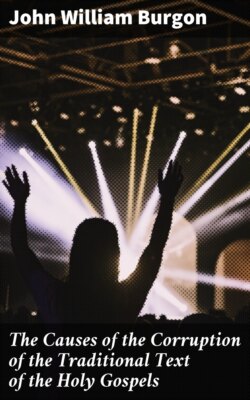Читать книгу The Causes of the Corruption of the Traditional Text of the Holy Gospels - John William Burgon - Страница 11
На сайте Литреса книга снята с продажи.
§ 3.
ОглавлениеTable of Contents
When I take into my hands an ancient copy of the Gospels, I expect that it will exhibit sundry inaccuracies and imperfections: and I am never disappointed in my expectation. The discovery however creates no uneasiness, so long as the phenomena evolved are of a certain kind and range within easily definable limits. Thus:—
1. Whatever belongs to peculiarities of spelling or fashions of writing, I can afford to disregard. For example, it is clearly consistent with perfect good faith, that a scribe should spell κραβαττον[15] in several different ways: that he should write ουτω for ουτωσ, or the contrary: that he should add or omit what grammarians call the ν εφελκυστικον. The questions really touched by irregularities such as these concern the date and country where the MS. was produced; not by any means the honesty or animus of the copyist. The man fell into the method which was natural to him, or which he found prevailing around him; and that was all. 'Itacisms' therefore, as they are called, of whatever kind—by which is meant the interchange of such vowels and diphthongs as ι-ει, αι-ε, η-ι, η-οι-υ, ο-ω, η-ει—need excite no uneasiness. It is true that these variations may occasionally result in very considerable inconvenience: for it will sometimes happen that a different reading is the consequence. But the copyist may have done his work in perfect good faith for all that. It is not he who is responsible for the perplexity he occasions me, but the language and the imperfect customs amidst which he wrote.
2. In like manner the reduplication of syllables, words, clauses, sentences, is consistent with entire sincerity of purpose on the part of the copyist. This inaccuracy is often to be deplored; inasmuch as a reduplicated syllable often really affects the sense. But for the most part nothing worse ensues than that the page is disfigured with errata.
3. So, on the other hand—the occasional omission of words, whether few or many—especially that passing from one line to the corresponding place in a subsequent line, which generally results from the proximity of a similar ending—is a purely venial offence. It is an evidence of carelessness, but it proves nothing worse.
4. Then further—slight inversions, especially of ordinary words; or the adoption of some more obvious and familiar collocation of particles in a sentence; or again, the occasional substitution of one common word for another, as ειπε for ελεγε, φωνησαν for κραξαν, and the like;—need not provoke resentment. It is an indication, we are willing to hope, of nothing worse than slovenliness on the part of the writer or the group or succession of writers.
5. I will add that besides the substitution of one word for another, cases frequently occur, where even the introduction into the text of one or more words which cannot be thought to have stood in the original autograph of the Evangelist, need create no offence. It is often possible to account for their presence in a strictly legitimate way.
But it is high time to point out, that irregularities which fall under these last heads are only tolerable within narrow limits, and always require careful watching; for they may easily become excessive or even betray an animus; and in either case they pass at once into quite a different category. From cases of excusable oscitancy they degenerate, either into instances of inexcusable licentiousness, or else into cases of downright fraud.
6. Thus, if it be observed in the case of a Codex (a) that entire sentences or significant clauses are habitually omitted:—(b) that again and again in the course of the same page the phraseology of the Evangelist has upon clear evidence been seriously tampered with: and (c) that interpolations here and there occur which will not admit of loyal interpretation:—we cannot but learn to regard with habitual distrust the Codex in which all these notes are found combined. It is as when a witness, whom we suspected of nothing worse than a bad memory or a random tongue or a lively imagination, has been at last convicted of deliberate suppression of parts of his evidence, misrepresentation of facts—in fact, deliberate falsehood.
7. But now suppose the case of a MS. in which words or clauses are clearly omitted with design; where expressions are withheld which are confessedly harsh or critically difficult—whole sentences or parts of them which have a known controversial bearing;—Suppose further that the same MS. abounds in worthless paraphrase, and contains apocryphal additions throughout:—What are we to think of our guide then? There can be but one opinion on the subject. From habitually trusting, we shall entertain inveterate distrust. We have ascertained his character. We thought he was a faithful witness, but we now find from experience of his transgressions that we have fallen into bad company. His witness may be false no less than true: confidence is at an end.
